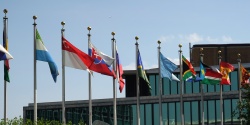Published: 07.02.2020

The United Nations forum will witness yet another attempt by radicals to try to push concepts such as sexual and reproductive rights, sex education and abortion into the international discourse. UNWomen – a UN entity focused on women's rights – announced that it will hold a special event called ‘Generation Equality Forum’. The purpose of the conference, co-organised by the governments of France and Mexico, is to celebrate the 25th anniversary of the Beijing Platform for Action. The previous attempt to introduce these concepts into international law took place during the Nairobi summit, but ultimately proved unsuccessful.
The Generation Equality Forum will be a two-stage conference commemorating the adoption of the Declaration and Platform for Action that was the crowning achievement of the Fourth World Conference on Women in Beijing (1995). This event is often considered a milestone in the implementation of the feminist movement’s demands into the UN’s official language. It was also the first document that widely and consequently used the term ‘socio-cultural gender’, in line with the gender ideology, and included the ideological concept of structural sources of discrimination, the alleged origin of which are the traditional social roles of men and women. Both deliberations on the adoption of the Beijing Platform for Action and the contents of the document itself caused numerous controversies. As such, a significant number of countries raised objections to its most questionable parts (including those regarding reproductive rights and sexual and reproductive health).
Two large conferences are to be held as part of the Generation Equality Forum initiative – in Mexico (in May) and in Paris (in July). According to the information provided by the organisers, the primary goal of the conference is to gather everyone who is actively involved in promoting the feminist ideology in one place. The main discussion topics during the meeting will be ‘gender-based violence’, economic justice, bodily autonomy, sexual and reproductive rights, the feminist movements’ actions against climate change, technology and innovation for ‘gender equality’, as well as the feminist movements and their leadership as a whole.
During the Paris conference which is meant to summarise the Generation Equality Forum, countries wishing to join the coalition are to adopt the so-called ‘commitments’. Just as in the case of the Nairobi Summit, any agreements made at the conference will not be binding and the event itself will be of semi-official nature. These commitments will however, play a key role in the formulation of any future comments issued by the UN Committees and resolutions adopted by the UN General Assembly. They are also bound to be particularly important in light of the UN General Assembly's High-Level Meeting in September, during which a resolution based on them is to be adopted.
‘We constantly witness ever-stronger trends aimed at diluting the decisive influence that member states have on the nature of documents adopted at the UN forum. Adopting provisions and declarations based on the unanimous agreement of all countries is steadily becoming a thing of the past. Instead, the UN creates ‘obligations’ regarding controversial and strongly ideological concepts, such as sexual and reproductive rights, including the right to abortion and sex education, that will only ever be fully accepted by UN agencies, radical NGOs and select progressive states. It is impossible not to notice that these entities are meant to constitute yet another set of tools for exerting pressure on countries wishing to protect the natural social structures based on the traditional family model and respect for the right to life at its every stage’ – said Karolina Pawłowska, Director of the Ordo Iuris Centre of International Law.

17.04.2025
• The Ordo Iuris Institute has prepared an opinion for the UN as part of a thematic report on surrogacy and its impact on the rights of women and children.

• Representatives of Ordo Iuris took part in the second round of consultations ahead of the 58th Session of the UN Commission on Population and Development (CPD58) on global health policy.

09.04.2025
• On April 8, the Ordo Iuris Institute presented the Polish version of a document with proposals for reforming the European Union, prepared jointly with Hungary’s Mathias Corvinus Collegium (MCC).

The Court of Appeals in Lublin, Poland, has upheld the verdict of the Regional Court in Radom, sentencing a gynecologist to one year of imprisonment, suspended for three years. The doctor must also pay PLN 6,000 to the State Treasury in legal costs.